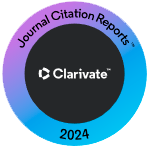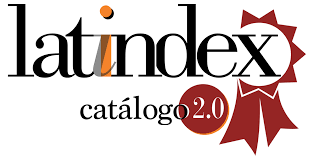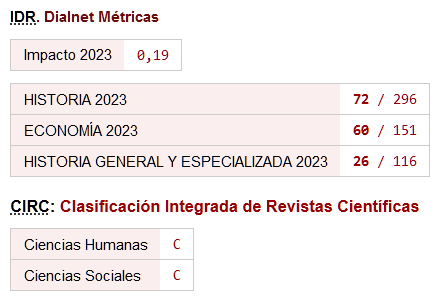De Computis uses the following peer review procedure:
1. When a paper is received, it is verified that it complies with the publication standards and the author is acknowledged, informing him/her that when it is evaluated, the evaluation results will be communicated to him/her.
2. Two or more referees are selected considering their knowledge on the topic analyzed by the paper, and where appropriate the territory it comprises. To do this, the journal requests the collaboration of external referees in the category of specialists in the topic of the paper to be reviewed, who become part of the internal list of referees if they wish.
3. Once the referees accept the review, the anonymous paper is sent to them and they are given a term of about six weeks.
- When the acceptance is received by the referee, he/she is responded thanking his/her disposal. If someone answered that he/she cannot, another referee is sought.
- An evaluation form is sent to the referees with detailed instructions for their revision: evaluation criteria of the originality, relevance, methodological rigor and formal presentation of the manuscripts as well as the way to carry out the revision.
- The evaluations are received. Acknowledgment of receipt and appreciation for the task done is communicated. It is also communicated that if he/she need it, it will be issued a certificate in the category of external referee of the journal.
- When a fortnight of the deadline for receiving the report passes, the pending task is remembered.
- Received the two evaluations, according to their results, it is decided:
• If the two are favorable, the paper is transferred to the publishable list.
The favorable editorial decision is communicated to the author(s), by means of a notification that includes the reasons why it has been accepted, as well as the opinions -original or adapted by the Editorial Staff-, issued by the referees.
• If one is favorable and the other negative, a third revision is requested, which is the one that allows deciding definitively. In these cases, the editorial decision that is communicated to the author(s) is: "Rectifications are needed and to revise again"
• If both are negative, or two of the three are negative, it is not accepted for publication. In these cases, the editorial decision that is communicated to the author(s) is: "Reject".
4. The author (s) who receive the favorable evaluations have about one month to submit the revised paper. He/she is also requested to communicate the modifications made by means of a letter addressed to the referees, detailing the changes made.
5. Once the revised paper is received, it is verified that the author (s) have modified the text according to the suggested changes. He/she is notified that the paper is accepted for publication and he/she is required for an Abstract in English.
6. To the author(s) who have requested is provided with a certificate of acceptance of his/her paper in the current open number at that time.
Open access policy
This journal provides immediate open access to its content, based on the principle that providing an open access to research helps to a greater global exchange of knowledge.
De Computis offers immediate open access to its content under the principle that offering the research to the public free of charge contributes to a greater exchange of global knowledge. No fees will be charged, either for sending, or for posting papers.
During the submission process, authors are permitted and encouraged to share their paper electronically. For example, they can upload it to institutional repositories or their own website. This can facilitate productive exchanges and result in the published article being cited more quickly and frequently.
Preservation policy
The publisher, the AECA association, firmly believes in the importance of preserving academic research in the long term. In this sense, the De Computis journal is aware of and takes responsibility for the enormous effort invested by authors and reviewers to achieve publication, and so that it does not end up losing its content, in the hypothetical case that this journal ceases to be published. activity or any other problem that may affect the published works arises, establishes a series of measures to digitally preserve its content. Traditionally, university libraries have been responsible for preserving academic content. However, one of the challenges faced by 'Open Access' journals (regardless of the many advantages they have) is that someone must ensure the long-term preservation of their content. To achieve this end, De Computis is part of the 'Public Knowledge Project's Private LOCKSS Network' (PKP-PLN), which will automatically archive all content each time a new issue is published. The LOCKSS system is also used to create a file system distributed among collaborating libraries, with permanent files in case their restoration is necessary.
In addition, in order to digitally preserve all the documents it houses, the Computis journal has an action plan with a series of basic measures to protect and ensure the digital viability of its contents:
-Monthly Backups and periodic Backups
-Storage on external servers
-Deposit of files in easily readable formats (PDFs)
-Regular checks of the integrity of the files to avoid their corruption
-Use of DOIs in their new materials
Principles of ethics, negligence statement, plagiarism detection policy and use of artificial intelligence tools
1. Responsibilities or behavior of the editorial board and editorial committee
- The description of the peer review processes is defined and made known by the Editorial Board and the Editorial Committee so that the authors know what the evaluation criteria is. Both editorial bodies will always be ready to settle any controversy that arises in the evaluation process.
- The Editorial Board assumes the responsibility of duly informing the authors of the phase of the editorial process in which the paper is, as well as the resolutions of the opinion.
2. Responsibilities and behavior of publisher
- The publisher is responsible for everything published in the Journal. They will strive to meet the needs of readers and authors, to constantly improve the quality and impact of the Journal, as well as to push academic and scientific standards.
- The publisher is willing to publish corrections, clarifications, retractions, and apologies when necessary.
- The decision of the publisher to accept or reject a paper for publication will be based only on the importance of the paper, the originality, clarity and relevance that the paper represents for the Journal.
- The publisher undertakes to guarantee the confidentiality of the evaluation process.
- After the review process, and while the paper is declared “publishable” by the referees, the editor is responsible for deciding which paper will be published in the Journal.
- The publisher will evaluate the manuscripts and their scientific content without distinction of race, gender, sexual orientation, religious beliefs, ethnicity, nationality, or the political philosophy of the authors.
- The editor and the Editorial Board will not disclose any information about a manuscript sent to any person other than the author, referees, potential referees, or other editorial advisers.
- Unpublished materials disclosed in a submitted manuscript will not be used in personal research by the publishers or members of the Editorial Board without the express written consent of the authors. Privileged information or ideas obtained through peer review will be confidential and not used for personal benefit. Editors will make fair and impartial decisions and ensure a fair and appropriate peer review process.
3. Responsibilities of the authors
1. Authors must guarantee that their manuscripts are the product of their original work and that the data has been ethically obtained. Furthermore, they must guarantee that their papers have not been previously published or that they are not being considered in another publication. A paper will be considered as previously published when any of the following situations occurs (these criteria refer to previous publications in printed or electronic form, and in any language) when:
- The full paper has been published.
- Extensive fragments of previously published materials are part of the paper sent to the Journal.
- The paper submitted to the Journal is contained in reports published in extenso (30% or more of the paper content).
- The paper has been published in another language and what the authors submit is a translation of it.
2. For the publication of their papers, the authors must follow the editorial norms for the publication of paper defined by the Editorial Committee.
3. The authors will send the Journal an original of the article without personal information (name, contact details, affiliation, etc.) and excluding their name from the bibliographic references in which it appears.
4. The authors of original research reports must present an accurate description of the work done, as well as an objective argument for its importance.
5. Each paper must contain enough information and references to allow others to use the paper. Fraudulent or deliberately inaccurate statements constitute an unethical behavior and are unacceptable.
6. Authors must ensure that they have written the original papers entirety, and if the authors have used a paper or words of others, it must be properly cited. Plagiarism, in all its forms, constitutes an unethical behavior and is unacceptable. Consequently, any manuscript that commits plagiarism will be rejected and not considered for publication.
7. An author should not publish manuscripts that describe essentially the same research in more than one journal or primary publication. Submission of the same manuscript to more than one journal constitutes unethical behavior and publication is unacceptable.
8. The sources used must be properly registered. Authors should cite publications that have been influential in the nature of the paper presented. Information obtained privately, through conversations, mails, or discussions with others, should not be used without explicit written permission from the author.
9. Authorship should be limited to those who have made a significant contribution to the conception, design, execution, or interpretation of the study. All those who have made significant contributions should appear as co-authors. The first authors should ensure that all co-authors are included in the paper and that all have approved the final version of the document and have agreed to submit it for publication.
10. Authors must reveal in their manuscript any financial or interest conflict that could influence the results or interpretation of their paper. Sources of financial support (or institutional sponsorship) received for the realization of the paper must be disclosed. Authors must disclose any public or private support or funding for the research, including the funding agency, program, and grant code, if applicable.
11. When an author finds a significant error or inaccuracy in his/her published article, it is his/her duty to immediately notify the Journal Editor and cooperate with the publisher to retract or correct the article.
4. Referees' responsibilities
This journal supports the principles of transparency and good practices determined by the Publishing Ethics Committee (COPE). It also underlines the following points:
1. The referees accept to report on any unethical behavior by the authors and to indicate all the information that justifies the rejection of publication of the papers. In addition, they must commit to keeping the information related to the papers they evaluate confidential.
2. For the review of the papers, the referees must have the necessary guidelines, provided by the Editorial Board, to do this task.
3. The selected referees must notify the Editorial Board, in the shortest possible time, if they are qualified to review the paper and if are able to do it.
4. Any manuscript received for revision must be treated as a confidential paper. It must not be revealed or discussed with other experts, except with the express authorization of the publisher.
5. Referees must behave themselves objectively. Any personal criticism to the authors is inappropriate. Referees should express their views clearly and with valid arguments.
6. Any inside information, or ideas, acquired from the revision process, must be kept confidential, and will not be used for any personal gain.
7. Referees should not evaluate manuscripts in which they have conflicts of interest.
5. Detection and action policies in case of plagiarism
The journal supports the anti-plagiarism principles determined by the International Committee of Ethics in Scientific Publication – COPE.
It also emphasizes that the papers with any trace of plagiarism will be checked for its possible degree of copying. In case of a copy, the author(s) submitting the paper will be sent evidence that prove plagiarism and will be asked for an immediate answer. If the plagiarism is verified De Computis:
1. Inform the author(s) of the plagiarized paper.
2. Inform the editor of the journal in which the original plagiarized article was published.
3. If it had been an article already published in De Computis, it will publish an official retraction of the article.
4. It will not publish any other article by the authors involved in the plagiarism for a period of five years.
5. Any ethical violation related to the article will be resolved using the protocols established by the International Committee of Ethics in Scientific Publication - COPE: http://publicationethics.org/files/All_Flowcharts_Spanish_0.pdf
6.The authors will expressly declare which Artificial Intelligence tools they have used and for what purpose.
Interoperability protocols - Information Services
1. Interoperability protocol used: OAI-PMH
The content of this journal is available in the main search engines (e.g., Google Scholar). De Computis uses free software OJS, and the journal's website is compatible with OAI-PMH requirements.
In this way, the metadata can be collected and updated by the services that use this protocol (e.g., BASE, OAIster ... etc.).
2. Digital Object Identifier (DOI)
DOI is a unique identifier that can be assigned to any type of content. It is used to create a URL (adding "https // doi.org / ...") and it will always be redirected to the original page where the corresponding metadata can be retrieved (such as information on the authors, publishers, year of publication, etc.).
For those publications that are under 'Open Access' (such as De Computis) the DOI identifier will redirect to a website showing the full article without restrictions. This is the case for this publication and when for any reason the web is not available, then the documents can be downloaded from those databases and indexes in which the journal is archived.
Crossref is the organization responsible for assigning DOIs to academic items (articles, books, databases, etc.). De Computis is a member of Crossref, and each time a new issue is published, DOIs are being deposited in Crossref databases in the same act.
3. Open Researcher & Contributor ID (ORCID)
ORCID is to researchers what DOI is to scientific production: a unique identifier that will accompany the researcher forever. The importance is such that it eliminates the possibility of confusion, especially in the cases of authors with similar names. Researchers are also given the possibility to automatically update all their scientific production published through a web page.
De Computis will require, for at least the main author, the corresponding ORCID number. All authors are recommended to supply this number: it is free and the benefits to be obtained are long-term. More information can be found by clicking here. As a Crossref member we are associating each article (DOI) with its corresponding authors through their ORCID accounts.
Editorial practices in Gender Equality
The journal will report on whether the source data of the research takes gender into account, and these are adequately reflected in order to allow the identification of possible differences.
The use of inclusive language is requested (Gabe, M. (2010). How do you say? Guide for communication with Gender Equality. https://www.mugarikgabe.org/), for example:
• Use real generics (ages, professions, social groups…): indigenous peoples instead of indigenous people.
• Use double forms, masculine and feminine, to stand out or make visible.
• Alternate the order, because it defines power, not invariably indicating boys and girls, but also girls and boys.
• Emphasize gender when dealing with themes/roles that are not usual for women or men.
• Use metonymic terms (a figure of speech that substitutes the generic masculine for the profession they carry out, the position they occupy, the place, etc.).
• Remove the article and determiner in neutral nouns to avoid masculinizing them: professionals in the sector, instead of professionals in the sector.
• Give the same treatment to women and men, without asymmetries. Avoiding referring to women only by their proper name or with diminutives if in the same context this is not done with men.









